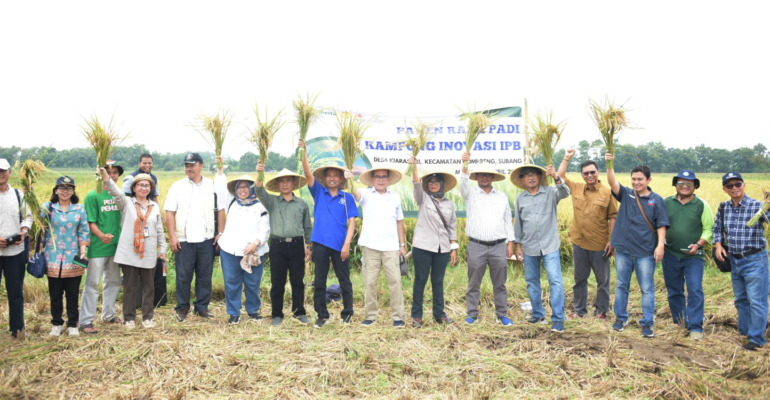IPB University Successfully Increases Rice Production by 32 Percent on 350 Ha of Paddy Fields in the IPB Innovation Village, Subang

The dissemination of IPB University’s technological innovations has had a positive impact on national food production. During the harvest festival in the IPB Innovation Village, Subang (21/4), the Dean of the Faculty of Agriculture (Faperta) at IPB University, Prof Suryo Wiyono, stated that the application of various IPB University innovations and technologies has successfully increased rice production by up to 32 percent on 350 hectares of paddy fields in Kiarasari Village, Compreng District, Subang Regency, West Java.
“The innovations and technologies of IPB University in the IPB Innovation Village, Subang, have been able to achieve an increase in productivity from 7.3 tons of dry paddy per hectare to 9.72 tons per hectare. This means that productivity has increased by 32.8 percent,” explained Prof Suryo during the harvest festival event.
He added that the IPB Innovation Village, Subang, has led to an increase in the selling price of paddy by 200 rupiahs per kilogram because it is absorbed by Sari Bumi Nusantara (SBN), a rice milling company owned by IPB University alumni located in the area.
Furthermore, agricultural mechanization and reduced pesticide use in the IPB Innovation Village, Subang, have also led to cost efficiency in production. Production cost savings can reach up to 25 percent.
According to him, the pattern of the IPB Innovation Village, Subang, is highly feasible to be expanded and replicated on a district, provincial, and national scale.
IPB University’s Vice Rector for Global Connectivity, Collaboration, and Alumni Relations, Prof Iskandar Siregar, stated during the event that the IPB Innovation Village, Subang, program is concrete evidence that IPB University is not only focused on producing scientific journals but also actively engaged in the field to make a positive impact on society.
The IPB Innovation Village, Subang, was initiated in 2021 between Faperta IPB University, SBN, the IPB Subang Alumni Association (HA), the Kiarasari Village Government (Pemdes), and with support from the Subang Agricultural Office. The pioneer of this innovation is Dr Sugiyanta (alm) as the Dean of Faperta IPB University for the period 2020-2025 along with the Faperta and Faculty of Agricultural Technology (Fateta) teams.
In its first two years (2021-2022), the IPB Innovation Village, Subang, received support through the Kedaireka Matching Fund program from the Ministry of Education, Culture, Research, and Technology (Kemdikbudristek) of the Republic of Indonesia.
In its development, the IPB Innovation Village, Subang, has also been supported with various infrastructure such as warehouses, combine harvesters, pumps, transplanters, and tractors. These facilities were provided by the Ministry of Agriculture (Kementan) of the Republic of Indonesia.
Moreover, during the first planting season (MT 1), the IPB Innovation Village, Subang, was supported with agricultural production facilities (saprodi), such as fertilizers, seeds, biostimulants, and pesticides through the Balanced Fertilization Program. To run the IPB Innovation Village, Subang, IPB University also collaborates with SMKN Compreng.
Prof Suryo Wiyono also explained that substantively, the IPB Innovation Village, Subang, has three components. First, upstream-downstream integration – pre-planting – on-farm – harvesting – post-harvest and marketing. Second, the application of upstream-downstream innovations, and third, a one-village area: 500 hectares.
Several innovations that have been implemented include dapok and hydroponic nurseries, mechanization of planting with transplanting, plant bioimmunization for resilience against plant pests and diseases (PPD), as well as monitoring and control of pests, especially stem borers. Additionally, the IPB Innovation Village, Subang, also applies the trap barrier system (TBS) technology for rodent control, as well as optimization of fertilization with a combination of organic fertilizers and NPK.
“We also conduct trials of spraying biofertilizers and biopesticides with drones and mechanization of harvesting. Meanwhile, for post-harvest, processing and marketing are carried out at SBN,” said Prof Suryo.
Furthermore, there are several innovations that are still in development. These include petal digitization technology, fertility mapping of 1 Village: 10,000 (the only one in Indonesia), plant health monitoring with drones, automatic weather station (AWS)-based PPD forecasting, and institutional strengthening.
The IPB Innovation Village, Subang, has involved 10 lecturers from various departments of Faperta, Fateta, and the Faculty of Mathematics and Natural Sciences (FMIPA). It also involves as many as 35 students in research, independent internship (Merdeka Belajar Kampus Merdeka/MBKM), field practice, as well as teachers and 77 students from SMKN Compreng.
The rice harvest festival in the Subang Innovation Village was also attended by the Institute Secretary (Prof Agus Purwito), Chairperson of the Science and Technology Zone Institution (Prof Erika B. Laconi), Director of Crop Processing and Marketing (Batara Siagian, SP, MP).
Also present were the Acting Chairman of the Plant Seed Certification and Supervision Institute (BPSBTPH) of West Java (Wahid Sarifudin, MM), Chairperson of the Subang Agriculture Office (Dra Nenden Setiawati, MSi), Kiarasari Farmers Group (Gapoktan), Chief of Kiarasari Village, IPB University lecturers, and representatives from SBN and HA IPB Subang.
On that occasion, Wahid, the Acting Chairman of BPSBTPH West Java, appreciated the achievements of the IPB Innovation Village, Subang. He mentioned that collaborative programs between the government, universities, and communities like this are also important to be expanded in scope.
“For farmers, (the IPB Innovation Village, Subang) is very good. If possible, this can also be implemented in areas with low productivity so that there will be visible improvements after this program,” he hoped. (Rz) (IAAS/RUM)


